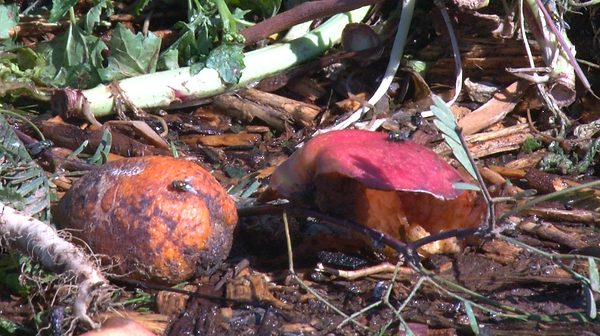Food Waste Fights Hunger in Phoenix

Food waste being reused as compost at the Society of St. Vincent de Paul’s Urban Farm in Phoenix, Ariz. In 2015, the Environmental Protection Agency (EPA) found that food makes up 22% of landfill waste. Photo by Christina Van Otterloo.
PHOENIX — Hunger might not seem like much of an issue here in the Valley, and that may be partially thanks to places like Tempe First United Methodist Church.
On Monday and Friday mornings from 6:30 a.m. to 10 a.m., Tempe First offers warm meals to those in need as part of its urban outreach ministry.
All the food supplied is donated, whether it be casseroles cooked by churchgoers or leftover food restaurants opt to donate rather than send to the landfill.
In the midst of receiving others’ excess food, Rev. Rosemary Anderson, Tempe First’s community minister and the director of its urban outreach, seeks to ensure nutritious options for those she serves. Of course, it’s hard to deny the allure of less healthy options.
“You know, pizza is such a big draw. I mean, there are people who will turn their noses at our hot egg and hashbrown casseroles because they’re waiting for their pizza,” Anderson said.
Anderson is not alone in her pursuit for nutritious options from food waste or excess.
Over in Phoenix, one organization is seeking to increase access to healthy foods and to reduce food waste.
At the Society of St. Vincent de Paul, they don’t just feed the hungry — they grow their own food too.
Broccoli, lemons, lettuce and more can be found at their Urban Farm.
All crops are grown in soil mixed with compost that’s made from the kitchen’s very own food scraps.
Like donating leftover food, composting is another method of reducing food waste sent to the landfill. Plus, it has an added bonus of sustaining new growth.
The farm’s director, David Smith, finds the amount of food trashed disturbing.
“It’s a huge issue. The 40% of our total food supply nationally that is thrown away is really just a huge problem,” Smith said. “It just shouldn’t happen. I mean, why should people be hungry in our community or anywhere else when 40% of the food is going to waste?”
While food waste and hunger remain prevalent issues in society, at the very least, efforts like those by the Urban Farm and Tempe First are reducing the amounts of waste and rumbling stomachs in the area.